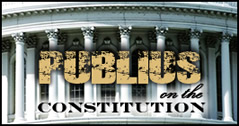By
Publius Huldah
April 4, 2012
NewsWithViews.com
A little knowledge is a dangerous thing; and no one illustrates this Principle better than Forbes’ writer Rick Unger in his article, “Congress Passes Socialized Medicine and Mandates Health Insurance - In 1798,” Washington Post writer Greg Sargent and Georgetown University history professor Adam Rothman.
In 1798, Congress passed An Act for the relief of sick and disabled Seamen which required the master of every American ship arriving from foreign ports to any port of the United States, and American ships engaged in the coastal trade using those ports, to pay a small fee to the federal government for every seaman employed on his ship. The funds so raised were used to care for sick and disabled seamen in the marine hospitals established in the ports of the United States.
So! Unger cited this 1798 Act and chortled with glee that our Framers supported “socialized medicine”; and so the “political right-wing” should stop “pretending” that our Founding Fathers would oppose obamacare.
Greg Sargent chimed in to the same effect, and quoted history professor Adam Rothman for the idiotic propositions that
“…the post-revolutionary generation clearly thought that the national government had a role in subsidizing health care … that in itself is pretty remarkable and a strong refutation of the basic principles that some Tea Party types offer … This defies a lot of stereotypes about limited government in the early republic."
But Unger’s, Sargent’s and Rothman’s statements are so transparently ignorant they can be disposed of in a few paragraphs:
Congress’ Three Categories of Legislative Powers
One: Congress has only limited legislative powers over the Country at large. These legislative powers are restricted to war, international commerce & relations; and domestically, the creation of an uniform commercial system: weights & measures, patents & copyrights, a monetary system based on gold & silver, bankruptcy laws, and mail delivery. Various Amendments granted to Congress certain powers over civil rights. These enumerated powers are the only areas wherein the national government has lawful (constitutional) authority over The States and The People in The States. In all other matters [except those listed at Art. I, Sec. 10] the States and The People retained supremacy, independence, and sovereignty.
Two: Article I, Sec. 8, clause 17, U.S. Constitution, says:
The Congress shall have Power To exercise exclusive Legislation in all Cases whatsoever, over such District (not exceeding ten Miles square) as may, by Cession of particular States, and the Acceptance of Congress, become the Seat of the Government of the United States, and to exercise like Authority over all Places purchased by the Consent of the Legislatures of the State in which the Same shall be, for the Erection of Forts, Magazines, Arsenals, dock-Yards, and other needful Buildings; [boldface mine]
“Exclusive Legislation in all Cases whatsoever” over “dock-Yards.” Do you see? It is this clause which grants to Congress authority to establish marine hospitals on dock-Yards belonging to the United States. Congress has a general legislative authority over the federal enclaves, such as dock-Yards. That legislative authority is limited only by the Bill of Rights.
In Federalist Paper No. 43 at 2., James Madison explains in three short paragraphs [read them!] why the federal government must have “complete authority” over the federal enclaves listed at Art. I, Sec. 8, cl.17.
Alexander Hamilton in Federalist No. 32 (2nd para), comments also on the grant of "EXCLUSIVE LEGISLATION" over the federal enclaves [capitals are Hamilton’s] in “The last clause but one in the eighth section of the first article…”
Do you see? That grant of “exclusive legislation” is restricted to the federal enclaves.
Three: Article IV, Sec. 3, cl. 2, grants to Congress the “Power to dispose of and make all needful Rules and Regulations respecting the Territory or other Property belonging to the United States…”
Madison shows in Federalist No. 43 at 5. that “the Territory” referred primarily to the Western Territory before it was formed into States.
| Subscribe to the NewsWithViews Daily News Alerts! |
That’s it, Folks!
So! While Rick Unger crowed in his article,
“While I’m sure a number of readers are scratching their heads in the effort to find the distinction between the circumstances of 1798 and today, I think you’ll find it difficult.”
It’s not difficult at all! All one has to do is read Art. I, Sec. 8, cl. 17, which permits Congress to make such a law for American ships using the dock-Yards belonging to the United States. That’s what “exclusive Legislation in all Cases whatsoever” means. Do you see?
Congress has no such legislative authority for the Country at large. There, it is limited and enumerated.
� 2012 Publius Huldah - All Rights Reserved
Publius Huldah is a retired attorney who now lives in Tennessee. Before getting a law degree, she got a degree in philosophy where she specialized in political philosophy and epistemology (theories of knowledge). She now writes extensively on the U.S. Constitution, using the Federalist Papers to prove its original meaning and intent. She also shows how federal judges and politicians have ignored Our Constitution and replaced it with their personal opinions and beliefs.h
E-Mail: publiushuldah@gmail.com











 Share
This Article
Share
This Article






